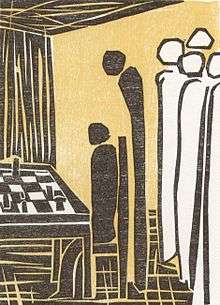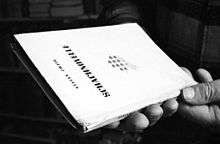The Royal Game

The Royal Game (or Chess Story; Schachnovelle in the original German) is a novella by Austrian author Stefan Zweig first published in 1941, just before the author's death by suicide.[1] In some editions, the title is used for a collection that also includes "Amok", "Burning Secret", "Fear", and "Letter From an Unknown Woman".[2]
Plot summary
Driven to mental anguish as the result of total isolation by the National Socialists, Dr B, a monarchist hiding valuable assets of the nobility from the new regime, maintains his sanity only through the theft of a book of past masters' chess games which he plays endlessly, voraciously learning each one until they overwhelm his imagination to such an extent that he becomes consumed by chess.
After absorbing every single move of any variation in the book, and having nothing more to explore, Dr B begins to play the game against himself, developing the ability to separate his psyche into two personas: I (White) and I (Black). This psychological conflict causes him to ultimately suffer a breakdown, after which he eventually awakens in a sanatorium. Being saved by a sympathetic physician, who attests his insanity to keep him from being imprisoned again by the Nazis, he is finally set free.
After happening to be on the same cruise liner as a group of chess enthusiasts and the world chess champion Czentovic, he incidentally stumbles across their game against the champion. Mirko Czentovic was a peasant prodigy possessing no obvious redeeming qualities besides his gift for chess. Dr B helps the chess enthusiasts in managing to draw their game in an almost hopeless position. After this effort, they persuade him to play alone against Czentovic. In a stunning demonstration of his imaginative and combinational powers, Dr B sensationally beats the world champion.
Czentovic immediately suggests a return game to restore his honour. But this time, having sensed that Dr B played quite fast and hardly took time to think, he tries to irritate his opponent by taking several minutes before making a move, thereby putting psychological pressure on Dr B, who gets more and more impatient as the game proceeds. His greatest power turns out to be his greatest weakness: he devolves into rehearsing imagined matches against himself repeatedly and manically. Czentovic's deliberation and placidness drive Dr B to distraction and ultimately to insanity, culminating in an incorrect statement, after which Dr B awakens from his frenzy.
Historical background

Following the occupation and annexation of Austria by Nazi Germany, the country's monarchists (i.e. supporters of Otto von Habsburg as the rightful Emperor-King and the rule of the House of Habsburg), conservatives as well as supporters of Engelbert Dollfuss' Austrofascist regime, were severely persecuted by the Nazis, as they were seen as opponents of the Nazi regime. Thousands of monarchists were executed or sent to concentration camps, and the pretender to the throne, Otto von Habsburg, fled to the United States, being sentenced to death in absentia by the Nazis.[3]
Adaptations
This novella was the inspiration for the 1960 Gerd Oswald film Brainwashed, originally titled Die Schachnovelle, as well as for the 1980 Czechoslovakian film Královská hra (The Royal Game).[4]
An opera based on the novel premiered at the Kiel Opera House on 18 May 2013. The music was by Cristóbal Halffter, and the libretto by Wolfgang Haendeler.[5]
The story was the basis of the production "64 Squares" from the Rhum and Clay Theatre Company presented at the Edinburgh Festival Fringe in August 2015. In this production the character "B" is played by three actors, both separately and together, assisted by a percussionist.
External links
- Elke Rehder: Remarks on The Royal Game by Stefan Zweig 1942–1944 An article from 2015 with pictures on the history of Schachnovelle.
- PushkinPress.com English editions of Stefan Zweig's novellas
- Legamus.eu Audiobook version of the novella (in German)
References
- ↑ "A classic rediscovered: Grandmaster". The Economist. Retrieved 9 March 2015.
- ↑ Zweig, Stefan (1981). The Royal Game and Other Stories. New York: EP Dutton.
- ↑ "Fall of Austria". University of Minnesota Center for Holocaust and Genocide Survivors. Retrieved 9 March 2015.
- ↑ "Brainwashed (1960)". IMDB. Retrieved 9 March 2015.
- ↑ EvS Music Foundation, retrieved 26 June 2012